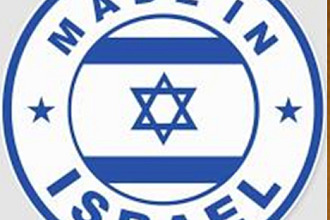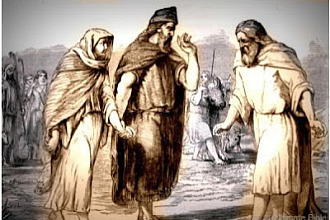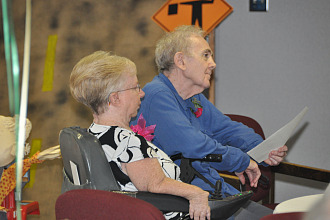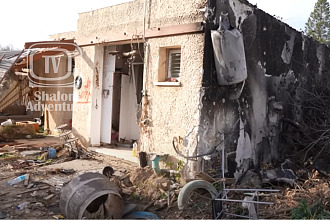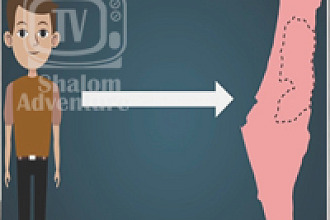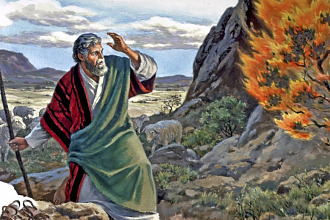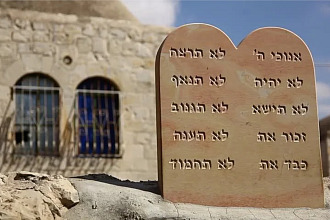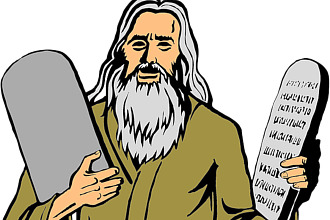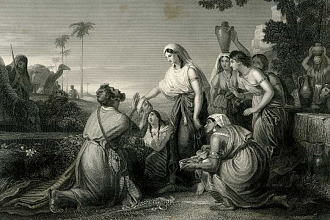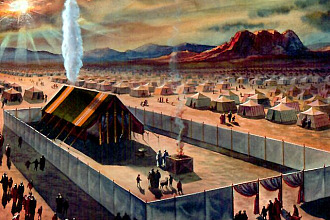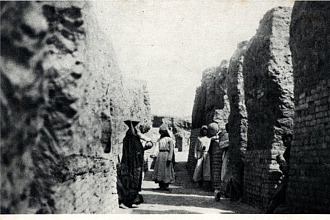Parasha for the Week: Netzavim-Vayelech Deuteronomy 29:9 - 31:30
Haftarah for the Week: Isaiah 61:10 - 63:9; Isaiah 55:6 - 56:8
Besorat Yeshua: Mark 8:14 - 9:1
Overview
Netzavim: Deuteronomy 29:9 - 30:20
On the last day of his life, Moshe gathers together all the people in a final exhortation.
The covenant includes not only those who are present, but even those generations yet unborn. Moshe admonishes the people again to be extremely vigilant against idol worship.
Moshe describes the desolation of the Land of Israel which will be a result of the failure to heed G-d's mitzvoth.
The conclusion will be apparent to all - the People of Israel have forsaken the One who protects them, in favor of idols which can do nothing.
Moshe promises, however, that the people will eventually repent after both the blessings and the curses have been fulfilled.
Moshe tells the people to remember that the Torah is within the grasp of every believer.
The Parasha concludes with a dramatic choice between life and death. Moshe exhorts the people to choose life.
Vayalech: Deuteronomy 31:1 - 31:30
On this, the last day of his life, Moshe goes from tent to tent throughout the camp, bidding farewell to his beloved people, encouraging them to keep the faith. Moshe tells them that whether he is among them or not, G-d is with them, and will vanquish their enemies. Then he summons Yehoshua, and in front of all the people, exhorts him to be strong and courageous as the leader of Israel. In this manner, he strengthens Yehoshua's status as the new leader. Moshe teaches them the mitzvah of Hakhel: That every seven years on the first day of the intermediate days of Succoth, the entire nation, including small children, is to gather together at the Temple to hear the King read from the Book of Devarim. The sections that he reads deal with faithfulness to G-d, the covenant, and reward and punishment. G-d tells Moshe that his end is near, and he should therefore summon Yehoshua to stand with him in the Mishkan, where G-d will teach Yehoshua. G-d then tells Moshe and Yehoshua that after entering the Land, the people will be unfaithful to Him, and begin to worship other gods. G-d will then completely hide his face, so that it will seem that Israel is at the mercy of fate, and that they will be hunted by all. G-d instructs Moshe and Yehoshua to write down a song - Ha'azinu - which will serve as a witness against G-d's people when they sin. Moshe records the song in writing and teaches it to Bnei Yisrael. Moshe completes his transcription of the Torah, and instructs the Levi'im to place it to the side of the Aaron (Holy Ark).
"Repentance is about Deeds and Character "
The Torah states: "And you shall return and hearken to the voice of the Almighty." (Deuteronomy 30:8). This is taught previously in verse 2, why is it mentioned again? Before a person does teshuva (repent), corrects his mistakes in deed and character according to the Torah standard, he is unaware of the many things he does wrong. After he returns to the Torah path, he becomes aware of other more things that need to be corrected. Hence, the Torah repeats its call to return to the Almighty - this time with a greater depth and breadth. There is always room for improvement - refining our actions and our character!
HAFTARAH Isaiah 61:10 - 63:9; Isaiah 55:6 - 56:8
Our consolation comes this week from Isaiah 61: 10 to 63:9 and from Isaiah 55:6 to 56:8. "I delight greatly in the LORD; my soul rejoices in my G-d. For he has clothed me with garments of salvation and arrayed me in a robe of righteousness (Isaiah 61:10).
Zion matters for the Lord. G-d has the same purpose for his people, to shine among the nations, "For Zion's sake I will not keep silent, for Jerusalem's sake I will not remain quiet, till her righteousness shines out like the dawn, her salvation like a blazing torch" (Isaiah 62:1).
Israel will succeed in the mission "to be a light among the nations". The nations will see your righteousness, and all kings your glory; you will be called by a new name that the mouth of the LORD will bestow. (Isaiah 62:2).
The result of G-d's people proclamation is that the Lord, the Messiah will come in Glory, "The LORD has made proclamation to the ends of the earth: "Say to the Daughter of Zion, 'See, your Savior comes! See, his reward is with him, and his recompense accompanies him.'" (Isaiah 62:11) If G-d is their Lord, the Messiah will be their Savior.
We should continue to seek the Lord, "Seek the LORD while he may be found; call on him while he is near." (Isaiah 55:6).
Even the sinner and the wicked can have mercy, "Let the wicked forsake his way and the evil man his thoughts. Let him turn to the LORD, and he will have mercy on him, and to our G-d, for he will freely pardon. (Isaiah 55:7). But they must repent, "For my thoughts are not your thoughts, neither are your ways my ways," declares the LORD. (Isaiah 55:8).
Besorat Yeshua Mark 8:14 - 9:1
Parasha: Moshe gathered Israel and gave them some final instructions for the covenant: "You are standing here in order to enter into a covenant with the LORD your G-d, a covenant the LORD is making with you this day and sealing with an oath, to confirm you this day as his people, that he may be your God ..." (Deuteronomy 29:12-14)
Besora: Yeshua took his disciples to Caesarea Philippi. Yeshua is ready to reveal to them who he is: "Yeshua asked "Who do people say I am?" Peter answered, "You are the Mashiach." (Mark 8:27; 29)
Yeshua knows that many people would not be happy to hear this truth: 1) The Romans, because they heard that the Messiah must seat on the throne of David. In their understanding, he will refuse the authority of Caesar. 2) the leadership of Israel who was at that time corrupted: "Yeshua warned them not to tell anyone about him" (Mark 8:30).
Parasha: Moshe starts to share with the people of Israel that he arrives at the end of his mission on the earth, The LORD said to Moses, "Now the day of your death is near. Call Joshua and present yourselves at the Tent of Meeting, where I will commission him." So Moses and Joshua came and presented themselves at the Tent of Meeting. " (Deuteronomy 31:14).
Besora: Yeshua starts to share with his disciples that his death is near and that he will be rejected by the leaders and will suffer: "He then began to teach them that the Son of Man must suffer many things and be rejected by the elders, chief priests and teachers of the law, and that he must be killed and after three days rise again." (Mark 8:31).
Yeshua teaches to the people of Israel that it is not easy to follow him: "If anyone would come after me, he must deny himself and take up his cross and follow me. For whoever wants to save his life will lose it, but whoever loses his life for me and for the gospel will save it. What good is it for a man to gain the whole world, yet forfeit his soul? (Mark 8:34-36).


